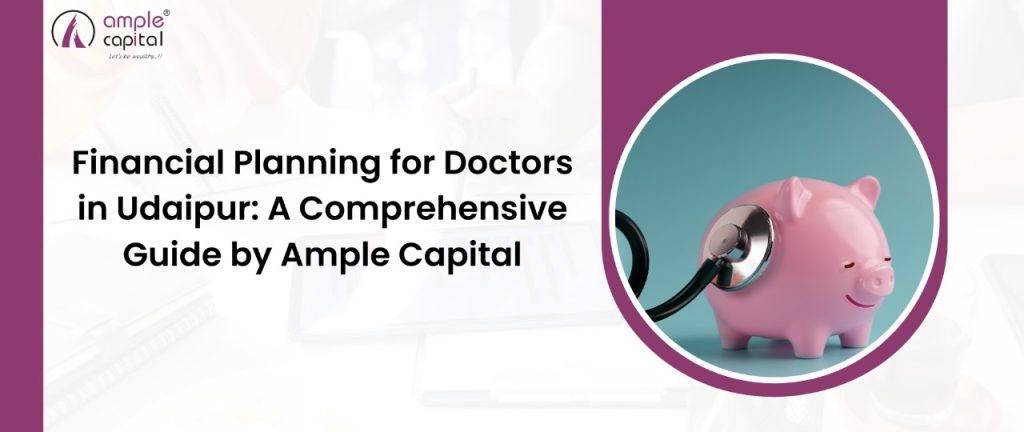Doctors dedicate their lives to healing others, often at the expense of their own well being. While their profession commands respect and stability, managing personal finances can be a significant challenge. The intricacies of financial planning for doctors in Udaipur involve addressing their unique financial situations, including student loans, irregular income streams, and the demanding nature of their profession. This guide by Ample Capital aims to provide a detailed roadmap for doctors to achieve financial stability and growth.
Understanding the Financial Landscape for Doctors
Income Structure and Variability
Doctors in Udaipur, like elsewhere, have multiple income streams. These can include salaries from hospitals, earnings from private practice, consultation fees, and more. Understanding these diverse income sources and their variability is crucial for sound financial planning.
- Salaries: Many doctors start their careers in hospitals or clinics, receiving a fixed salary. The salary can vary significantly based on specialty, experience, and the reputation of the institution.
- Private Practice: Running a private practice can offer higher earnings compared to salaried positions but comes with variability based on patient volume, fees, and location.
- Consultation Fees: Regular consultations, follow-ups, and specialist advice can provide a steady source of income.
- Medical Camps and Lectures: Participation in medical camps, workshops, and lectures not only enhances professional reputation but also contributes to income.
Financial Challenges
Despite the potential for high earnings, doctors often face unique financial challenges. Recognizing and addressing these pitfalls is very essential for the effective financial management.
- Lifestyle Inflation: As income increases, the temptation to upgrade lifestyle significantly can erode savings and delay financial goals.
- Lack of Budgeting: Busy schedules may lead to neglect in tracking expenses, resulting in overspending and insufficient savings for essential financial goals like debt repayment and retirement planning.
- Procrastination in Financial Planning: The demanding nature of the medical profession often leaves little time for financial planning, leading to missed investment opportunities and unplanned debt accumulation.
- High Debt Levels: Substantial educational loans and additional loans for home purchases or setting up a practice can be burdensome if not managed properly.
- Inadequate Insurance Coverage: Underestimating the importance of adequate insurance can lead to severe financial implications in case of health issues, disabilities, or legal liabilities.
Practical Steps for Financial Planning
Monitoring Income and Expenses
Keeping track of all the income sources and expenses is the first step towards the effective financial management. Doctors should maintain detailed records of their salary, private practice earnings, consultation fees, and other incomes to understand cash flow and plan accordingly.
Creating a Comprehensive Budget
A detailed budget helps in tracking expenses and ensuring savings goals are met. Categorize expenses into essentials (like household expenses and loan repayments) and non-essentials (like dining out and vacations) to identify areas where costs can be cut to increase savings.
Setting Financial Goals
Doctors should set clear short term, medium term, and long term financial goals. Short term goals might include paying off the student loans and building an emergency fund. Medium term goals could involve buying a home or saving for the children’s education. Long-term goals should focus on planning for retirement and managing your estate.
Managing Debt Effectively
Effective debt management is crucial for financial health. Prioritise repaying high interest of the loans and consider the refinancing options to reduce interest costs. Setting up a repayment plan for student loans and other debts ensures systematic clearing without causing financial strain.
Investing Wisely
Investment is key to growing wealth. Explore various investment options like equity, mutual funds, fixed deposits, and real estate. Diversifying investments helps in managing risks and achieving better returns. Consulting with a AMFI Registered Investment Advisor that can provide guidance on the best investment strategies tailored to the individual financial goals and risk tolerance.
Ensuring Adequate Insurance Coverage
Having comprehensive insurance coverage is essential. Ensure you have health insurance to cover medical expenses, life insurance to protect your family, disability insurance in the case you are unable to work, and professional liability insurance to protect against legal claims.
Regular Financial Reviews
Regular financial reviews help in staying on the track with the financial goals. Periodically review your income, expenses, investments, and insurance coverage. Adjustments might be very necessary based on changes in income, market conditions, or personal circumstances.
Seeking Professional Advice
Doctors might benefit from professional financial advice. Consulting with a AMFI Registered Investment Advisor ensures expert guidance tailored to specific needs, helping with investment planning, debt management, insurance coverage, and overall financial strategy.
Conclusion
Financial planning for doctors in Udaipur requires a specialized approach that considers their unique financial circumstances and goals. By recognizing common financial falls and taking the practical steps towards financial management, doctors can ensure a secure and prosperous future. Remember, the key to effective financial planning is understanding your financial environment, setting clear goals, and seeking professional advice when needed.
At Ample Capital, we understand the unique financial challenges faced by doctors. Our comprehensive financial planning services are designed to help you navigate these challenges and achieve your all financial goals. Contact us today to start your journey towards financial stability and the growth.







